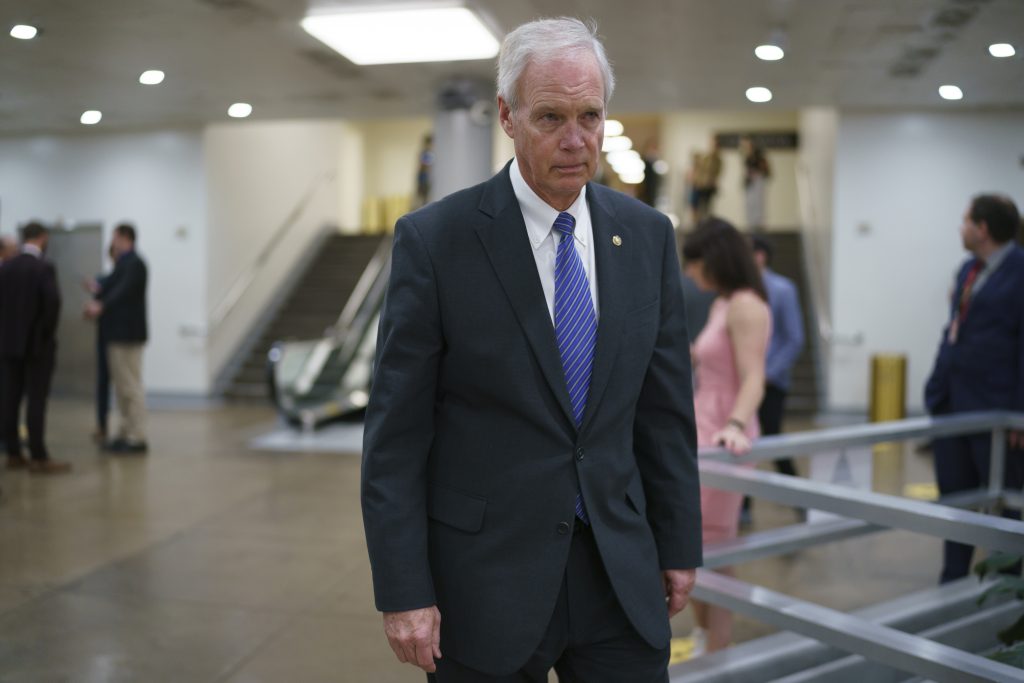
U.S. Sen. Ron Johnson promised in 2016 not to run for a third term, attacking his Democratic opponent as a “career politician.” Now, with an election year looming, he’s reconsidering his vow, saying at a town hall in Elkhart Lake, Wis., that he’ll make a decision in the “next couple weeks” on a re-election campaign.
But does Ron Johnson even want to be here? Or is he ready to give in to the pull of the “Great Resignation” and trade in the Big Lie for the Big Quit?
In August, he told conservative radio host Wendy Bell he didn’t want to be a senator: “I’d rather be somewhere else. I’d rather do something else.”
Discussing the Affordable Care Act on “The Truth with Lisa Boothe” podcast in July, Johnson reflected on his time in office: “I feel really bad that I’ve been here now probably 11 years and we’ve doubled the debt.”
“Obamacare’s still in place, and we’ve doubled the debt. I don’t feel like my time here has been particularly successful,” he added.
During a wide-ranging interview on “The Brian Kilmeade Show,” Johnson said he was disappointed in his fellow Senate Republicans and denounced their bipartisan effort to pass an infrastructure bill.
“It’s unfortunate that we have Republicans cooperating with, basically, Bernie Sanders and Chuck Schumer and Nancy Pelosi,” he said. “It’s just unfortunate.”
Nineteen Republican senators helped pass the $1 trillion infrastructure package that President Joe Biden signed on Monday. The legislation is expected to provide Wisconsin with $5.5 billion for transportation projects and could create 2 million jobs each year over the next decade.
Thirteen House Republicans also supported the bill, and Johnson finds this all a bit upsetting. He’s praying for gridlock.
“Gridlock in many cases is really pretty good. It’s a lot better than the alternative,” Johnson told conservative radio host Joe Pags early this year. “And in a split Senate, when people are reaching out, can’t we do something? How about infrastructure? Which by the way, our infrastructure’s crumbling, we do need to do something about [it]. But the problem is we already spent $4.5 trillion in non-targeted, shotgun approach COVID relief.”
Despite his laments, Johnson continues to fundraise for his potential re-election, taking in $906,000 from July to September, but at a pace lagging behind three potential Democratic opponents vying for his seat during the latest FEC reporting period.
Johnson also consistently ranks as the most vulnerable incumbent Senate Republican in 2022. A recent Marquette University Law School poll showed that 36% of respondents viewed him favorably, and 42% viewed him unfavorably. While 38% said they would reelect Johnson, 52% said they would support someone else.
The trendline of support for Johnson is heading in the wrong direction. According to the Milwaukee Journal Sentinel, “Marquette has polled on Johnson nearly 50 times since 2012, and he has received his highest negatives in the last two surveys.”
Florida Senator Rick Scott, who leads the National Republican Senatorial Committee, predicts Johnson runs for re-election.
But for the Wisconsin senator, whether campaigning or not, he could be among the 55% of Americans looking for a new job in the next twelve months.
